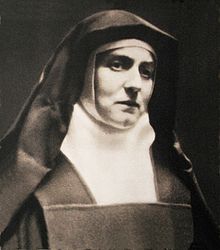A quarter of a century ago, on the eve of the new millennium, Pope Saint John Paul II, on October 1st, 1999, the feast of Saint Therese of Lisieux, proclaimed Saints Bridget of Sweden, Catherine of Siena and Teresa Benedicta of the Cross (Edith Stein) co-patronesses of Europe, in his Apostolic Letter Spes Aedificandi (‘building up hope, or hope must be built up). The beleaguered continent could use their intercession, more than now than when that prescient proclamation was made. Here is an excerpt with the Holy Father’s words on Edith Stein, whose own entrance into eternity, we just celebrated, to whom, as a fellow philosopher, and who suffered under the Nazis as he had done, Karol Wojtyla had a great devotion:
8. With Edith Stein—Saint Teresa Benedicta of the Cross—we enter a very different historical and cultural context. For she brings us to the heart of this tormented century, pointing to the hopes which it has stirred, but also the contradictions and failures which have disfigured it. Unlike Bridget and Catherine, Edith was not from a Christian family. What we see in her is the anguish of the search and the struggle of an existential “pilgrimage”. Even after she found the truth in the peace of the contemplative life, she was to live to the full the mystery of the Cross.
Edith was born in 1891 to a Jewish family of Breslau, which was then in German territory. Her interest in philosophy, and her abandonment of the religious practice which she had been taught by her mother, might have presaged not a journey of holiness but a life lived by the principles of pure “rationalism”. Yet it was precisely along the byways of philosophical investigation that grace awaited her: having chosen to undertake the study of phenomenology, she became sensitive to an objective reality which, far from ultimately dissolving in the subject, both precedes the subject and becomes the measure of subjective knowledge, and thus needs to be examined with rigorous objectivity. This reality must be heeded and grasped above all in the human being, by virtue of that capacity for “empathy”—a word dear to her—which enables one in some way to appropriate the lived experience of the other (cf. Edith Stein, The Problem of Empathy).
It was with this listening attitude that she came face to face, on the one hand, with the testimony of Christian spiritual experience given by Teresa of Avila and the other great mystics of whom she became a disciple and an imitator, and, on the other hand, with the ancient tradition of Christian thought as consolidated in Thomistic philosophy. This path brought her first to Baptism and then to the choice of a contemplative life in the Carmelite Order. All this came about in the context of a rather turbulent personal journey, marked not only by inner searching but also by commitment to study and teaching, in which she engaged with admirable dedication. Particularly significant for her time was her struggle to promote the social status of women; and especially profound are the pages in which she explores the values of womanhood and woman’s mission from the human and religious standpoint (cf. E. Stein, Woman. Her Role According to Nature and Grace).
9. Edith’s encounter with Christianity did not lead her to reject her Jewish roots; rather it enabled her fully to rediscover them. But this did not mean that she was spared misunderstanding on the part of her family. It was especially her mother’s disapproval which caused her profound pain. Her entire journey towards Christian perfection was marked not only by human solidarity with her native people but also by a true spiritual sharing in the vocation of the children of Abraham, marked by the mystery of God’s call and his “irrevocable gifts” (cf. Rom 11:29).
In particular, Edith made her own the suffering of the Jewish people, even as this reached its apex in the barbarous Nazi persecution which remains, together with other terrible instances of totalitarianism, one of the darkest and most shameful stains on the Europe of our century. At the time, she felt that in the systematic extermination of the Jews the Cross of Christ was being laid on her people, and she herself took personal part in it by her deportation and execution in the infamous camp of Auschwitz-Birkenau. Her voice merged with the cry of all the victims of that appalling tragedy, but at the same time was joined to the cry of Christ on the Cross which gives to human suffering a mysterious and enduring fruitfulness. The image of her holiness remains for ever linked to the tragedy of her violent death, alongside all those who with her suffered the same fate. And it remains as a proclamation of the Gospel of the Cross, with which she identified herself by the very choice of her name in religion.
Today we look upon Teresa Benedicta of the Cross and, in her witness as an innocent victim, we recognize an imitation of the Sacrificial Lamb and a protest against every violation of the fundamental rights of the person. We also recognize in it the pledge of a renewed encounter between Jews and Christians which, following the desire expressed by the Second Vatican Council, is now entering upon a time of promise marked by openness on both sides. Today’s proclamation of Edith Stein as a Co-Patroness of Europe is intended to raise on this Continent a banner of respect, tolerance and acceptance which invites all men and women to understand and appreciate each other, transcending their ethnic, cultural and religious differences in order to form a truly fraternal society.

